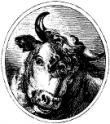How the cow ate the cabbage
In the Gardens of Myopia.
Dear Word Detective: Over the years I have used the phrase “I told him how the cow ate the cabbage!” which I picked up somewhere. Now an Aussie friend wants to know what it means. I know what I mean when I say it, but wonder what its origin is. — Jo Nicholas.

that ain't right.
That’s a good question, and one that has, fortunately, a definite answer. That’s not always the case when it comes to folk sayings, some of which turn out to be so obscure that the origin may never be known. I remember hunting for the origin of (or even a coherent explanation of) the 19th century phrase “to stick one’s spoon in the wall” (meaning “to die”) a few years ago. I never found it, and that phrase has been rattling around in the back of my mind ever since.
“To tell someone how the cow ate the cabbage” means to tell the person the unvarnished truth, even if the person would rather not hear it. It can also mean to state one’s opinion forcefully or to “tell someone off” (“The mechanic had been jerking me around for weeks, promising that every new repair would fix the problem, so I finally told him how the cow ate the cabbage and drove home”).
“How the cow ate the cabbage” is a folk saying of the southern US, most often heard in Texas and Arkansas, and probably dates back to at least the 1940s. It comes from the punchline to a joke that would, in that period, have been considered at least slightly “off-color.” Here goes:
A circus had arrived in a small town, and one morning one of the elephants managed to escape. The fugitive pachyderm made its way to the backyard garden of an elderly (and very near-sighted) woman, where it began hungrily uprooting her cabbages with its trunk and eating them. Alarmed by the apparition in her garden, the woman called the police, saying, “Sheriff, there’s a big cow in my garden pulling up my cabbages with its tail!” “What’s the cow doing with them?” he asked, to which the woman replied, “You wouldn’t believe me if I told you!”
Hey, I never said the joke was actually funny. In any case, the nicely alliterative “to tell someone how the cow ate the cabbage” quickly came to be a Southern catchphrase meaning “to tell someone a truth they don’t want to hear” (which, of course, is exactly what the woman in the joke refuses to do). In the “tell someone off” sense it also carries the rude implication of telling someone where they can stow the matter or object of contention.
Incidentally, in the 19th and early 20th century, the only place where residents of small towns in the US were likely to see a real live elephant was in just the kind of small traveling circus found in this joke, where the elephant was the big attraction. So prevalent was this small-town pachyderm-mania that by about 1835 “to see the elephant” had become a catchphrase meaning “to experience all that there is to see.” A darker sense arose a few years later, in which “to have seen the elephant” was used to mean “to be worldly, no longer innocent, to have learned a hard lesson.” By the time of the Civil War, “to see the elephant” had come to mean specifically “to experience combat for the first time” and thus to have learned the brutal truth about war.
Page 1 of 2 | Next page
